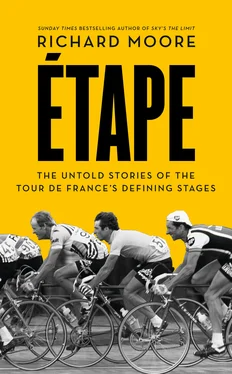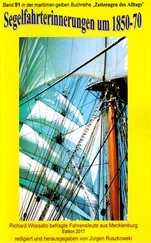Boardman kept talking about this illness, too. Now, however, he says he can’t remember being unwell. He thinks it might have been a case of getting his excuses in first. ‘I used to need mental crutches like that, like many athletes do. You’re hypersensitive to any sensation or the slightest twitch or anything. It’s a bit childish, but it’s a crutch, in case it goes wrong. You don’t just say, “I couldn’t go any faster and I wasn’t good enough.” You weren’t secure enough in those days to think like that.’
In the days before the prologue, Boardman carried on doing his own thing, as strange as it seemed to his team-mates. He had his routine for coping with the nerves. ‘What I used to do was read and sleep. They were my two escapes.’ To assist the ‘escape’ he liked science fiction – Iain M. Banks was a favourite. ‘It was a way to not be there, while you were still there. And I slept under pressure. A lot. Which is quite a handy trait.’
He didn’t do what his team-mates did, what professional riders had always done, which was to go out for easy rides in the week before the race, recce-ing the prologue course at a gentle pace to get a feel for it. ‘They used to go out and ride the course if it was open and have a chat,’ Boardman says. ‘I went out on my own and I could probably tell you now where all the grids were, where there was a bump on the road. I memorised it.’ Most importantly, he memorised it at the same speed as he would tackle it on race day. ‘They put the team car in front of me; I had to do it at race speed. So I had the car in front, it would take me up to speed, then get out of the way before the corners. I thought I could get round the whole course without braking, but that was the only way to find out. So I had it all mapped out. That was two days before. From that point forward, we got all the information we could.’
Boardman habitually uses ‘we’ instead of ‘I’, meaning his team – not his professional team-mates, who were mere colleagues, but his far more important support team, led by Keen. But Keen wasn’t there – he ‘felt like a fish out of water’, says Boardman, and rarely went to continental races.
Boardman’s wife, Sally, was in Lille. ‘I used to resent Sally being there,’ says Boardman, with a smile to suggest he is joking. Only, he isn’t really. ‘She used to have a good time, a party, and her friends came over. I’d see them, they’d come to the hotel, all in happy spirits. They were going to have a good day. And I’m thinking, I’m crapping myself here. I’ve got seven minutes that decide my salary for the next year. It used to, reasonably or not, make me quite angry.’
Did he dream of becoming only the second Brit after Tom Simpson to wear the yellow jersey? ‘I did, yeah. But you just go out there and try and win. That’s the beauty of the time trial. You do your thing. It was the psychologist who got me to realise that you can only do what you can.’
Prior to the Barcelona Olympics, Boardman spilled out his fears to John Syer. ‘What if this goes wrong? What if I can’t go fast enough? What if the other guy’s faster? What if I puncture?’
Boardman expected Syer to offer words of reassurance. Instead, he said: ‘Yeah, well those things could happen.’ Boardman was puzzled. ‘I said, “Hang on, aren’t you supposed to be helping me here?” But he said, “No, this is the deal, mate – elation and despair are two sides of the same coin, in equal and opposite proportion. If you want the big win, you’ve got to risk the big low. So instead of trying to deny that, why don’t we stare it in the face?”
‘I sat on the start line at the Olympics and thought, fuck it, I’ll just be as good as I can. And when I cross the line I’ll look at the board and see what I’ve done. He taught me that you can’t affect what others are doing, or let them affect you.’
Now, when it came to the ‘others’, there was only really one. Indurain. ‘He was a brick,’ Boardman says. ‘However he did it, it was pretty amazing.’ He had never raced Indurain before the start of the 1994 Tour, so predictions were difficult. While Indurain had won the last two prologues, Boardman was the Olympic pursuit champion and hour record holder. Indurain might confirm what many suspected – that continental road pros were a different breed, even a superior species. Then again, Boardman, although he came from a small pond, clearly had a special talent. The contrast between the pair was striking in almost every way. Indurain was tall and rangy, six foot two and twelve and a half stone; Boardman was compact and stocky, five foot nine but solid at eleven stone. On a bike, the differences were more marked: Indurain was a jumbo jet, Boardman a fighter plane.
‘It was really, really hot,’ Boardman recalls of the day. He didn’t have a special routine before the race. ‘Most of it was having the courage to do nothing. I learned that from my pursuiting days. Because when people are nervous, they go out for a ride. We were staying in a hotel just out of town. On the morning I went out on my bike for an hour. Just really easy. The others went for a couple of hours. The days before, too, they went out, and said, “Are you coming?” I said, “No, I’m going out on my own with two sprints.”
‘My routine was worked back from the time of the start: I want to be on the start line with three minutes to go, so how far is it, to walk from the bus to the start house? When am I going to warm up – because that had to be really close to the event. Where’s the signing on? When am I going to put my numbers on? When am I going to eat? It’s incredibly detailed. But the day is mainly waiting, until it’s time to act.’
While Boardman’s day was ‘dialled’, others’ were more flexible – or shambolic. ‘I remember riders getting their time trial bikes and getting their tools out, adjusting their saddles and bars.’ It was inconceivable to Boardman that this would not have been taken care of in advance. ‘This was my office; this was where I went to work. You don’t plug in a new piece of equipment before the most important meeting, do you?’
Boardman’s bike, a new Lotus ‘Superbike’, essentially a road version of the machine he’d ridden at the Olympics, attracted attention. LeMond, always interested in equipment, was spellbound. He warmed up facing Boardman outside the Gan team’s campervan. ‘Greg was like, “Oh, a shiny new piece of kit!” He was genuinely fascinated, and he picked your brains about equipment a lot. He was like a very, very intelligent kid.’
As he waited to start his effort, Boardman tried to take his psychologist’s advice and embrace the challenge ahead – which meant embracing his fear. ‘I thought, right, this is going to be the hardest thing I’ve ever done. And there’s no escaping that. There’s no pretending I’m going to have an easy day. It is going to be the most unpleasant thing I’ve ever done and I accept that.
‘It was quite liberating.’
The scale of the Tour was something new, even compared with the Olympics. ‘But I had to accept that all these people lining the road ahead of me, and the size of this event, and the millions of people watching. I can’t affect that and that doesn’t affect me. Put it to one side. It was all about my performance.’
Boardman was among the last starters, along with the young world road race champion, Lance Armstrong; finally, Indurain, in the yellow jersey as the previous year’s winner, would be the last man to go.
In the start house, Boardman was held up by an official and the TV camera lingered – the commentator Phil Liggett described it as ‘a tense but marvellous moment’ – before the countdown began, the official holding out five fingers and folding them over:
Читать дальше












